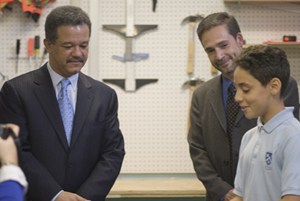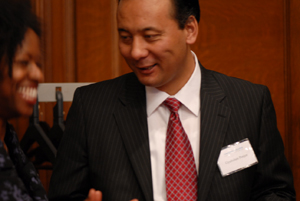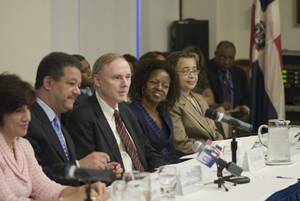Making More New Friends
Teachers College has entered into two new international
partnerships since the beginning of the fall term, creating memoranda of
understanding with the governments of the
In late September, D.R. President Leonel Fernández spent
an afternoon at Columbia Secondary School (CSS), the new science-themed public
school that
“Right now, there is an education crisis in the Dominican Republic,” Fernández said when he and a group of advisors and ministers met at TC with Provost Thomas James, Director of International Affairs Portia Williams, Kuhn, Maldonado-Rivera and others. “When you look at the statistics for our region, we are behind in everything that matters for the 21st century. We’re not investing enough in schools—at present about five percent of the gross domestic product. We need to change that, but we also lack a plan for improvement. Students are still learning by memorization—they’re not conceptualizing or learning how to use their knowledge in solving problems. So we need to change our philosophy of education, and we have to do it at a point where students first learn how to think.”
Fernández, who lived for some years in
James pledged TC’s cooperation. “Your words go to the heart of the mission of this institution, because if we’re not having an impact out in the world, our work wouldn’t matter. So we’re going to find ways to do this.”
Teachers College has also entered into partnership with
Located in South Asia, in the Eastern Himalayas,
Building on a relationship established through TC faculty
member Francisco Rivera-Batiz and his former Bhutanese student, Gyaltshen Penjor
(SIPA, 2000), who now heads the country’s Royal Council of Education, Teachers
College has agreed to provide training to Bhutanese educators, while serving in
an advisory capacity to the government as it seeks to formulate a national
curriculum framework. TC also seeks to improve teacher education and school
management in
Williams, who was named to head TC’s international
partnership efforts this past spring, said both agreements exemplify the kind
of work TC is seeking to do, “because they benefit our partners and create new
opportunities for our faculty and students.”
Typically, such arrangements come about because TC alumni working on the ground in a given country either approach the College to initiate a partnership or play a key role in facilitating the creation of one. The new work with the D.R. is something of an exception, however. President Fernández said he first learned of Kuhn’s work “when I was browsing on the Internet” and then instructed his aides to make inquiries.
In a special presentation during Fernández’s visit to the College, Kuhn, who served as thesis advisor to CSS Principal Maldonado during his student days at TC, elaborated on her approach, which is called Education for Thinking, and how it is being implemented at the school.
“We start by asking, ‘What skills do we most want middle school students to acquire during their years of formal schooling?,’” Kuhn said. “And the answer is: The intellectual skills that will prepare them to use their minds well to address the compelling needs and issues that arise in society.”
Among the core skills that Education for Thinking seeks to instill, inquiry and argument loom large. “Inquiry” includes identifying questions worth asking, making reasoned predictions, seeking informative evidence, analyzing evidence, identifying patterns, drawing conclusions and developing and testing models. Kuhn has developed special inquiry software programs that prod students to think this way. “Argument” covers the goals of engaging students in informed and reasoned debate about contemporary and enduring issues; helping them to learn to know their reasons, listen to others’ reasons and address them, understand the role of evidence in argument, and appreciate that the ultimate point to argument is to learn from different perspectives. To absorb these lessons, students first collaborate with a partner to argue against an opposing-side pair; use instant messaging software as a medium for classroom discussion; reflect on transcripts of past dialogues; and prepare for, conduct and review a full-group “showdown” debate on questions ranging from “should a family be allowed to educate a child at home” to “should the U.S. get involved in a foreign peace-keeping effort.”
At the end of her presentation, Kuhn showed a graph showing that students taught with the Education for Thinking program showed much greater use of true exchange (rebuttal sequence length) than those who were not.
Education for Thinking is supported by the U.S. Institute
for Education Sciences. To learn more about Education for Thinking, visit www.educationforthinking.org. To learn
more about
Published Monday, Nov. 10, 2008


